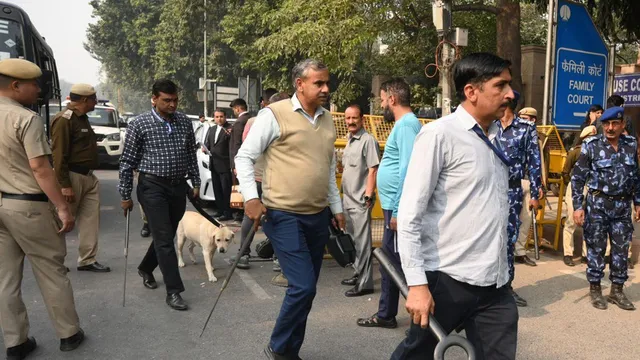- By Akansha Pandey
- Wed, 19 Nov 2025 01:18 PM (IST)
- Source:Jagran News Network
Panic ensued on Tuesday morning after four major district courts—Saket, Dwarka, Patiala House, and Rohini—along with two CRPF schools, received emails threatening bomb attacks. The threats were issued in the name of the terrorist organisation Jaish-e-Mohammed.
Immediate Response And Search Operations
Following the receipt of the emails, the buildings were hastily evacuated. The police, along with the Bomb Disposal Squad (BDS), sniffer dogs and forensic teams, immediately launched extensive search operations.
Patiala House: Hundreds of personnel meticulously searched the rooms.
Saket Court: Extra checks were initiated at metal detector gates.
Rohini Court: CCTV footage was scanned for suspicious activity.
Dwarka Court: Barricades were erected at entry points.
After an exhaustive search yielded nothing suspicious, the emails were declared hoaxes. Work at the courts and schools resumed after a disruption of approximately two hours.
High-Stakes Timing: The Terror Suspect Link
The threat to the Patiala House Court was particularly sensitive as it arrived shortly before the National Investigation Agency (NIA) was scheduled to produce Jasir Bilal Wani (alias Danish), an accused conspirator in a bomb blast case. Due to the scheduled appearance, the Rapid Action Force (RAF) had already been deployed outside the court premises.
The Broader Context: A Two-Year Pattern
For nearly two years, over a thousand threatening emails have been sent to various institutions, including schools, colleges, secretariats, and courts. While investigation agencies consistently declare these as hoaxes following technical inquiries, the sheer volume and persistence of these threats have raised alarms.
With terror network activities recently coming to light and several attack plots being uncovered across the country, security experts are re-evaluating these "hoaxes." The coordinated nature of these emails suggests they may not be mere pranks but could be indicative of a larger terrorist plot.
Also Read: No Sweaters, No Shoes: 10k Council School Kids Wait For Funds In Gautam Buddha Nagar
Investigative Challenges: Why Culprits Remain At Large
Tracing the actual source of these emails remains a significant challenge for the police, resulting in investigations often hitting a dead end.
Technology Used: Most emails are sent via VPNs (Virtual Private Networks), proxy servers, and the dark web, masking the sender's real location and identity.
Foreign Origins: Technical investigations often trace the IP addresses to foreign locations. Accessing data from servers located abroad is difficult due to complex international legal procedures.
Evasive Tactics: The use of frequently changing IP addresses and temporary email platforms prevents agencies from gathering concrete evidence.

